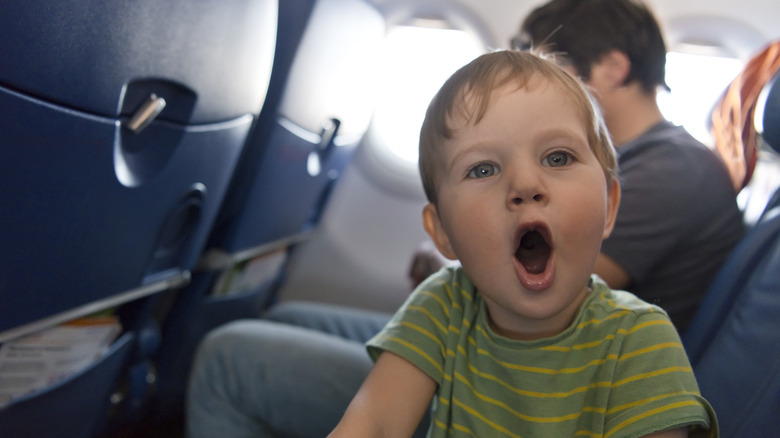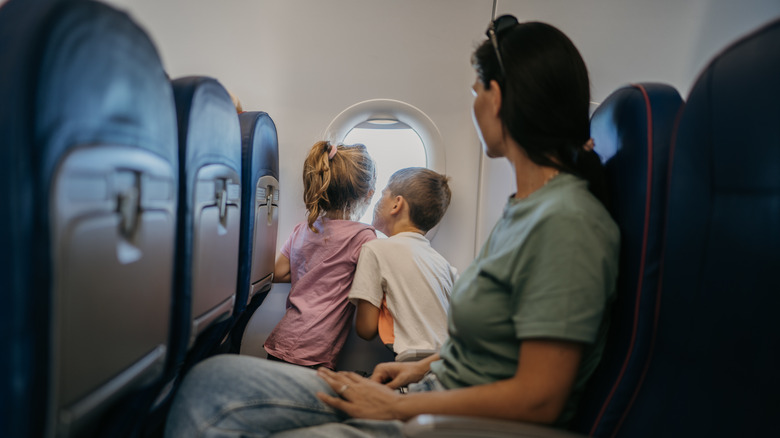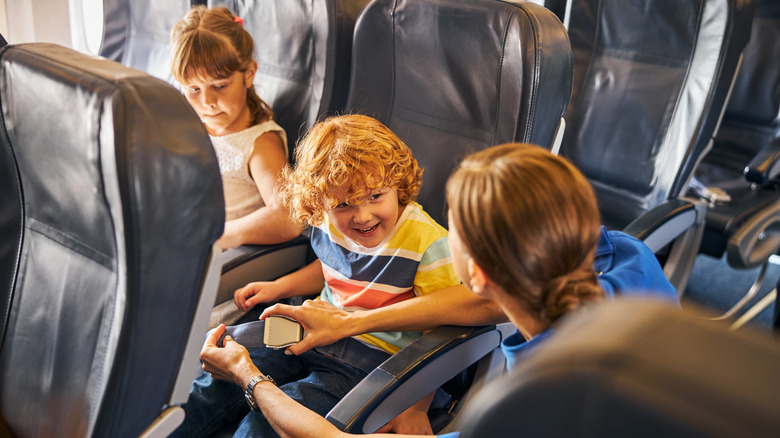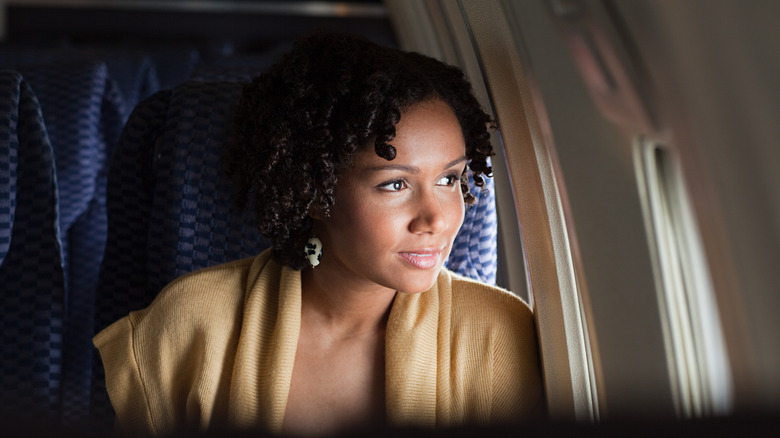Flight Attendant's 4 Tips For When Kids Kick The Back Of Your Seat
We may receive a commission on purchases made from links.
While we generally extol the joy, excitement, and wonder of travel (because traveling is wonderful), we'd be dishonest to not mention the headaches and annoyances that traveling occasionally entails. We don't mean the international ATM scams or the inherent risks of exploring more shadowy places, we're talking about the headaches and annoyances.
According to an airplane etiquette survey by Expedia, the single most annoying thing to happen on a flight is someone kicking your seat. Obviously, if an adult is purposefully kicking your seat (not accidentally kneeing it), then it's a different scenario, but 99.99% of seat-kickers are children. To be fair, flights can be boring, and if you're five, then you might want to kick the boredom around. Fair. But, this empathy doesn't change the facts. As a passenger, you paid for a "not-kicked-around" flight.
In the Expedia survey, which asked 1,005 American travelers, 64% of respondents cited "Rear-Seat Kickers" as the most problematic passengers. This beat the Aromatic, the Boozer, and the Chatty Cathy passenger. Again, the big difference here is that the seat-kicker is likely a child. While the situation isn't ideal, a flight attendant offers four tips for gracefully handling it.
Offer the kid a distraction
In an article written for Condé Nast Traveler, Bobby Laurie, a former flight attendant, explains that most flight attendants particularly dread the summer months of air travel. Why? Kids. Not because of a disdain for children. Simply put, the combination of kids flying with other passengers who aren't used to traveling around kids can be problematic. And, which seems completely fair, Laurie explains that flight attendants aren't exactly experts at soothing rambunctious children and that it's a tricky situation to perform parental interventions.
That said, flight attendants are responsible for the comfort and safety of all passengers. Laurie's first tip is to offer a distraction to the child, citing situations in which seat-kickers were successfully distracted by the "kickie" with a paper airplane, trinket, jangling keys, etc. It's just a distraction to redirect activities, in the hope that seat-kicking doesn't reassert itself as a fun option.
While everyone's different, with varying comfort levels of extraverted assertiveness, the tip conveys a larger point: By addressing the child directly — before the parent and before a flight attendant — fewer people are involved. It doesn't give air for creating a multi-partied ordeal.
Politely inform the parent
It's a delicate dance. Most parents will be apologetic and happy to resolve the situation. However, some parents may not appreciate you directly speaking to (or distracting) their child, while others may not appreciate you speaking to them either, as you're rightfully inferring that they do something. But, let's be clear. If the guardian is conscious, then you're right to expect a sliver of cognition that their child's seat-kicking impacts the person sitting in that seat. It's simply just airplane etiquette.
Unfortunately, in some cases, offering someone that insight could be defensively viewed as an indictment. And speaking to parents about parenting can be treacherous waters. But, as an aside and reminder, none of this is your fault.
In an effort to circumvent perceived "indictments," being polite can really go a long way. "In some cases, parents are doing the best they can, and in others, well, maybe there's room for improvement," Laurie writes. Either way, politely informing the parent of what's happening should work, especially if they just didn't notice.
Speak to a flight attendant
If the child is undeterrably gun-hoe about kicking seats and the guardian isn't helpful, then it's time to call in reinforcements. And, to iterate, if you're someone who's uncomfortable with speaking directly with another passenger, regardless of age, then it's not out-of-bounds to skip the first two tips and speak to a flight attendant first. Overall, the idea is to resolve the situation as quietly and easily as possible. So, on the one hand, not resolving amongst yourselves is an escalation. On the other, again, it's not your fault. And while flight attendants aren't family counselors or social soothsayers, their in-flight responsibilities are pretty broad.
In the Conde Naste article, Aimee LaMay, a flight attendant based in Orlando, says "We have to be a skilled negotiator in these situations. As a mom myself, there's a fine line between asking the parent if they need help, and having it appear that we're telling them that they're not doing their job." Along with their ability to intervene on your behalf, Laurie continues to explain that flight attendants on major airlines typically have things at their disposal to resolve the situation, such as extra snacks, juices, and activity sets.
Consider riding it out
So far, we've placed the onus for seat-kicking situations on misbehaving kids and aloof parents, and rightfully so. But, to keep matters in perspective, how bad is it actually? How long is the flight? Bruce Lee morning workout kicks or butterfly nudges? Each of the three aforementioned tips can help resolve the situation, but grinning and bearing the surrounding world is part of traveling.
According to a survey released by the Association of Flight Attendants, 85% of flight attendants dealt with unruly passengers in 2021, and 58% of flight attendants dealt with five or more incidents. Unfortunately, 17% of these incidents included a physical altercation. The point is, there are ways to resolve a seat-kicking situation, but patience may be the card to play in some cases. "Remember, as with all things related to tense air travel these days, a little empathy can do a lot to smooth things over," Laurie writes. While seat-kicking can be annoying, we're talking about children, and in most cases, parents trying their best. Overall, friendlier skies usually equate to less turbulent flights — headaches included.




